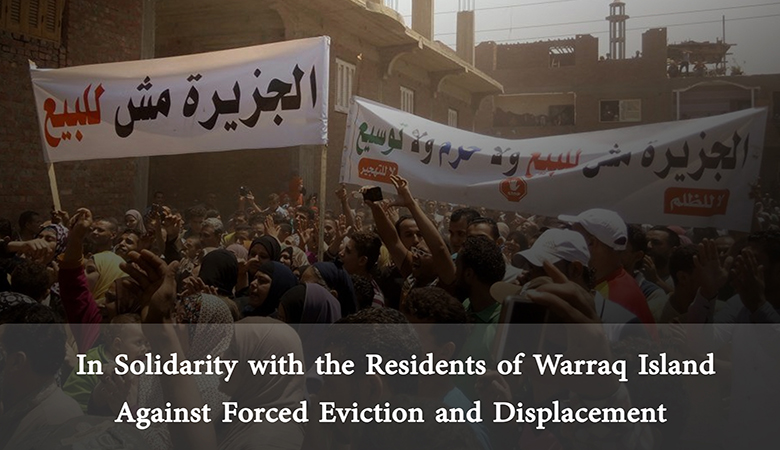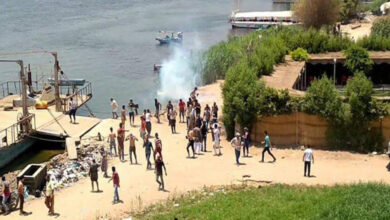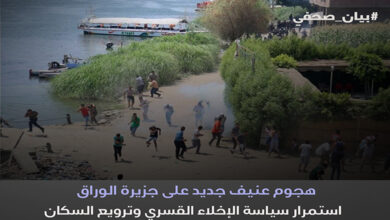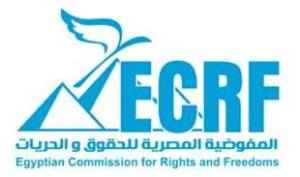In Solidarity with the Residents of Warraq Island Against Forced Eviction and Displacement

The undersigned express their solidarity and support for the demands of the families of Warraq Island following their meeting on October 11. The residents are committed to their lands and homes, asserting their right to reclaim their houses after the development of the island, as well as to continue medical treatment for those injured in assaults by security forces, some of whom suffer from permanent disabilities. They call for the lifting of the siege imposed on the island’s residents and the resumption of ferry services.
The signatories urge the Egyptian government to lift the security siege that has been in place since 2017, which has resulted in the Urban Communities Authority forcibly acquiring nearly 71% of the island’s land. Since July 16, 2017, the residents of Warraq Island have faced repeated incursions by police to forcibly evict them, resulting in the death of one resident and injuries to dozens more. To this day, several residents remain imprisoned on charges of joining a terrorist group.
Furthermore, the Egyptian government’s practices of demolishing agricultural lands on the island threaten the sustainability of the natural environment, undermining the vital resources that local communities depend on. These policies not only have environmental repercussions but also affect individuals’ rights to access natural resources and ensure food security. This destruction poses a real threat to sustainable environmental practices and the rights of future generations to a healthy environment, necessitating intervention to protect these lands and uphold human rights in this context.
The government justifies its position by stating that the eviction of the island is necessary for the implementation of the “Horus City” project, which aims to transform the island into a global commercial center, involving the construction of residential and commercial towers and hotels. As a result, agricultural land on the island has drastically diminished. The government views profit from this commercial project as more beneficial than maintaining the island’s sustainable agricultural nature.
However, these government policies violate the Egyptian constitution, which prohibits forced evictions. The government also breaches international treaties and agreements that emphasize the necessity of negotiating with the residents before commencing any developmental project. The security siege imposed on the island violates the residents’ fundamental rights to life and personal safety. The residents of Warraq live under continuous siege, prompting them to organize ongoing protests and demonstrations.
The question remains: Is there a solution? It seems that the use of force has not been effective in resolving the crisis, while the residents hope for a settlement that preserves their rights and avoids further conflict. Warraq Island will remain a symbol of the struggle between development and citizens’ rights in Egypt, continuing to be a topic of discussion about the balance between citizens’ rights to live on their lands and the state’s pursuit of large-scale development projects.
The signatories of the petition demand:
- Consideration of all possible alternatives to eviction in consultation with families to avoid eviction plans, including the right to legally contest these decisions if they persist.
- Full adherence to Article 63 of the Egyptian Constitution, which considers forced eviction a crime that is not subject to statute of limitations, as well as compliance with Egypt’s international treaties regarding the right to adequate housing and protection against forced eviction as part of the “right to an adequate standard of living,” as stated in Article 11(1) of the International Covenant on Economic, Social and Cultural Rights of 1966. General Comment No. 7 of 1997 from the UN Committee on Economic, Social and Cultural Rights states that before any eviction process begins, states parties must ensure that all available alternatives are explored in consultation with those affected to avoid the use of force. There must be legal remedies and procedures available for those affected by eviction orders, along with guarantees for everyone to receive fair compensation for affected properties.
- Eviction processes should not lead to the displacement of individuals or the violation of other human rights. If those affected are unable to support themselves, the state must provide adequate alternative housing or resettlement. In justified cases of eviction, the process should be carried out in accordance with international laws related to human rights, complying with principles of proportionality and reasonableness.
- Legal remedies and legal assistance should be made available to those affected by eviction and displacement decisions.
- Genuine consultation must be ensured with those affected, providing them with adequate time and information regarding the eviction and the alternative purpose of the land, alongside the presence of government officials during the process, clearly identifying the individuals responsible for it. Evictions should be avoided in adverse weather conditions or at night, with legal remedies and legal assistance available to those affected.
Background:
As part of the Nile Island Development Project outlined in the Cairo 2050 Plan, the General Authority for Urban Planning and the Greater Cairo Region Center prepared a new plan for Warraq Island in 2010, aiming to transform it into a new planned city, “Horus City.”
Located in the heart of the Nile, Warraq Island is administratively part of Giza Governorate, covering an area of between 1,500 and 1,800 acres. The island serves as a geographical meeting point for three major governorates: Cairo, Giza, and Qalyubia. The island’s residents, estimated at around 100,000, depend on agriculture and fishing as their primary sources of income, making it a place of significant economic and social importance for its inhabitants.
The crisis on the island began in 1998 when the government designated it as a nature reserve. This was followed by another decision in 2000 declaring it “of public utility,” which sparked widespread controversy between residents and the government. Residents, some of whom have property deeds dating back to 1905, felt threatened regarding their historical ownership of their lands. To ease tensions, Prime Ministerial Decree No. 848 of 2001 was issued, stating that residential buildings on Warraq and Dahab Islands should not be evacuated and allowing citizens to register their properties.
The dispute escalated in 2017 when it took a more confrontational turn. During a conference, President Sisi mentioned the necessity of evacuating the island’s residents, and on July 16, 2017, police forces launched an attack on the island to forcibly remove residents. The residents strongly resisted the eviction order, refusing to abandon their lands and homes.
Violent confrontations between security forces and residents resulted in the death of one resident and injuries to others. Since then, the government has imposed a security siege on the island, arresting hundreds to pressure the residents to leave their lands.





